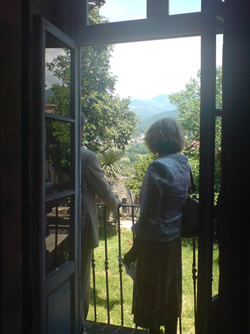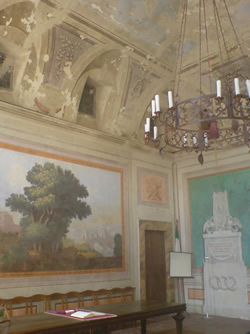

| JACOPO DA FIVIZZANO |
|
Welcome
|
| Home |
| Preview – Cultural Events |
| Essays, Poetry, Points of View |
| Archives |
| Contact Us |
| Reports
from our Correspondents |
| Institute |
| Educational Tours: We organize performances for you at home and abroad. Just have a look at our offers … here |
|
"What is Culture? This topic can be found ... here!" |
|
||
|
Grazia invited me on an excursion which turned out to be an adventure. It led us to an isolated and undisturbed region in the mountains, the Lusigiana, where villages seem to hang between cliffs and the wild blue yonder. The road had not a single straight stretch. John was our driver. In the back seat sat Grazia and a friend chatting and pointing out the details of interest of the region, not Italian high art and beauties, but rather, here a valley with a small romantic church, there, up on a promontory, a ruined ancient fortification, strict and cubistic as was the aesthetic preference of the d'Estes who were masters of most of the region. The mountain town of Fivizzano was our destination, fifty kilometers away but it took two and a half hours needed to drive there. Fivizzano is one among countless small Italian cities long in decline, bypassed by history, devastated by losses of young men in the First World War, then the massive destruction wrought by an earthquake in 1920, then the exodus of the young, the strong and the gifted through emigration, then the worldwide depression of the 1930's, then the havoc of the Second World War with partisans of all stripes warring with one another, and throughout it all, the poverty. We approached our goal. Before the city gate lies a welcoming plane with mature shade trees. From this sheltered vantage point, one can take in the majesty of the surrounding mountainscape with its panoply of hues quivering in the bright mid day sun. The road leads us through the gates to the "Piazza Garibaldi" -- what else could be its name -- with its monument to its fallen heroes of the first World War, ubiquitous to every Italian city and town. A narrow street is lined with once beautiful facades, having passed beyond the beauties of "the patina of age" and into plain ruin, but nevertheless suggestive of once-upon-a-time grandeur. A little further along, the street widens into a broad piazza. A fountain strews the sounds of rushing waters, as it has since the mid sixteenth century when Cosimo de Medici visited the city and decided to invest in it. The town after all belonged to the Medicis. The fountain and the Medici coat-of-arms over the rebuilt gates tell of those proud times. Now, we get to the reason why we set forth on this adventure in the first place. In front of a wonderful and harmonic facade of a palace (designed by a well known late Renaissance architect from the town of Massa, we learn) we meet a woman and her young daughter. She is dressed very conservatively Italian, with light green fitted designer jacket, and although a German named Engelhardt, speaks and behaves as a active Italian. Her Italian was so perfect that I could only turn pale with envy. She belongs to an international club of culturally engaged women and had organized this event, the purpose of which was to visit the "Fantoni Bononi Palazzo", a museum displaying the arts and methods of printing. Gradually, the different impressions began to come together to learn about Jacopo da Fivizzano. He lived in this city and began printing books, very early on, 1471, one year before the first printing in Venice. Soon, we find ourselves part of a group of very elegantly dressed people, mostly Italian, but nearby a Dane married to an English lady. I praise the Danish painter Abilgaard, who had spent time in Rome and was terribly important as an enlightened neo-classical spirit and am told that neither has he ever heard of him, but that the two enjoy skiing and gardening which their living in a mountain village allows them. Typically, the local "gentry" foreign and native, seize every opportunity to get together and undertake something of a culturally "elevated" nature. Everyone is in his or her finery, men in suit and tie, women with make-up and elegant shoes, their jewelry shining in the sunlight.
The nightmarish wheels begin to move, to force their captive bells to ring in a sort of disarray, each swinging in an ever increasing arc, the bells screaming louder, until it seems they are, with a hellish glee, about to destroy the stone tower that mounts them. Then, silence as each has become exquisitely balanced and locked in place upside down, with its open end facing skyward. There is anticipation, then all are released and begin to tip in unison, each beginning a precipitous arc, and with a sudden clang, there begins a kind of orderly, ear shattering descending melody, becoming more random and mercifully softer as the arcs precess, then the ascending process repeats itself as the wheels of hell once again bring each screaming bell agape skyward, hovering in anticipation. A remarkable opus, these bells, undoubtedly the masterpiece of some long forgotten genius who perhaps never ventured beyond his native city. To me, it seemed very threatening. But how could a simple "glockenspiel" seem so nightmarish? Now, I remember. In our schoolbook when I was a very young child, there was a picture of a little girl running for her life and a huge evil church bell with hands outstretched pursuing her, about to catch her, because she didn't want to go to church. My younger sister and I were terrified by this image. Then, there appeared on the scene an older, very distinguished looking man with flashing blue eyes and noble nose, in colorful shirt and suspenders. Doctor Loris Jacopo Bononi. He began to speak and could/would not stop. A bit later, it was established that the key to the palazzo that houses the museum was not to be had. Doctor Bononi was beside himself with fury and shame. He had purchased the palazzo, assembled the contents of the museum and bequeathed it to the city, and no one knew where the key could be, even though Frau Engelhardt finally explained me, in German, that she had prepared everything ahead of time for the visit. The group waited and waited, for about an hour, this being Italy, expecting the usual miracle to occur. An older, friendly man was woodworking in his street level "cantina", sanding away at an old door as the German lady tried desperately to reach somebody at the city offices, trying to reach anyone who knew the whereabouts of the elusive key. But nobody could be reached and Dottore Bononi became ever more agitated. I was afraid he might have a heart attack. He was going on about how he had spent nearly two million euros to preserve the patrimony of Fivizzano through this gift, and the city was so lacking in foresight that they wouldn't come up with funds to publicize it, maintain it, or even to cut the grass in the lovely garden that it includes. He was so disgusted that he himself even refuses to have a key, and this apparently made him the more furious. In the mean time, as if on cue, the group, as one, accepted that there would be no miracle today and moved on toward the piazza. The woodworker waved at me from across the way and opened a door to his house and showed me proudly a restored old manufactory in which, once upon a time, shoes were made by hand. The conditions were rude and Spartan, but everything of importance to the owner hung on his wall, from old photos to the framed diplomas of his children, their passports to the grander world. Meanwhile, the group had commandeered the banquet room of a cafe on the piazza, the best and likely the only one to be found nearby, and il gentile Signore Bononi began to hold forth. And now began a treat, to be addressed by such a fine mind, an educated classical humanist, a country doctor of good family, then a professor of medicine, then a researcher in America, in the process making a large fortune. His passion includes not only rare books, but the entire range of Italian grandeur and patrimony, now forgotten by a prosaic generation and fading from memory. He spoke without pause for a full two hours, with an elegant eloquence approaching poetry, the beautiful poetic language of a passing generation. From his satchel he drew rare, leather bound antique books printed by the legendary Jacopo da Fivizzano himself, one of which, he told us, he located in Connecticut. Each exemplar he handled with love, holding it like a newborn baby, with his beautiful slightly shaking hands. Cicero's speeches were among them. Gradually, his great disappointment came to light, that his bequest to the city, the museum and its precious contents, indeed, this very birthplace of movable type printing in Italy is of vanishing significance in the present age. With greatest passion and pain, with tears filling his lively blue eyes, he asks what has happened to culture? to humanism? Everyone else in the room was still as a mouse. At times glances were exchanged. Not everyone shared the good doctor's prognosis. His excursions ranged from scandal filled day-to-day Italian politics to annihilation of Indians in the name of Catholicism. Grazia, a faithful Catholic, cast a bewildered look my way at this past theme, which I avoided because I stand on the humanist's side of this issue. Finally, he read to us a beautiful hymn of his own creation, an ode to "the book" and the applause broke forth. A gentleman made a short speech and presented him with a book as a gift, a work about local cooking traditions. Grazia explained to me how people in poor regions, like in the Lusigiana are skilled at using herbs to make their simple fare more palatable. I have some growing and doing well in my window garden in Barga. Yes, culture and good food, and this beauty all about that grips the heart. As we finally, toward midnight, arrived back in Barga, we found ourselves in the middle of a celebration. Young men were standing in open cars driving by, shouting, honking, flags waving. The city's soccer team had won an important match, releasing a flow of testosterone. This prosaic scene would certainly not have pleased old Jacopo Bononi. He was probably caressing his books, that Jacopo da Fivizzano printed more than five hundred years ago, as he fell asleep with Cicero's words in his heart.
|
|
Correspondent |
| Always on duty, he is collecting interesting news items for you. |
| Please send us an e-mail if you have an important event or topic on which you would like him to write a report. |
| Impressum |
|
©Network
for International Cultural Exchange
2003-2009 /JACOPO DA FIVIZZANO by Birgit Urmson |

